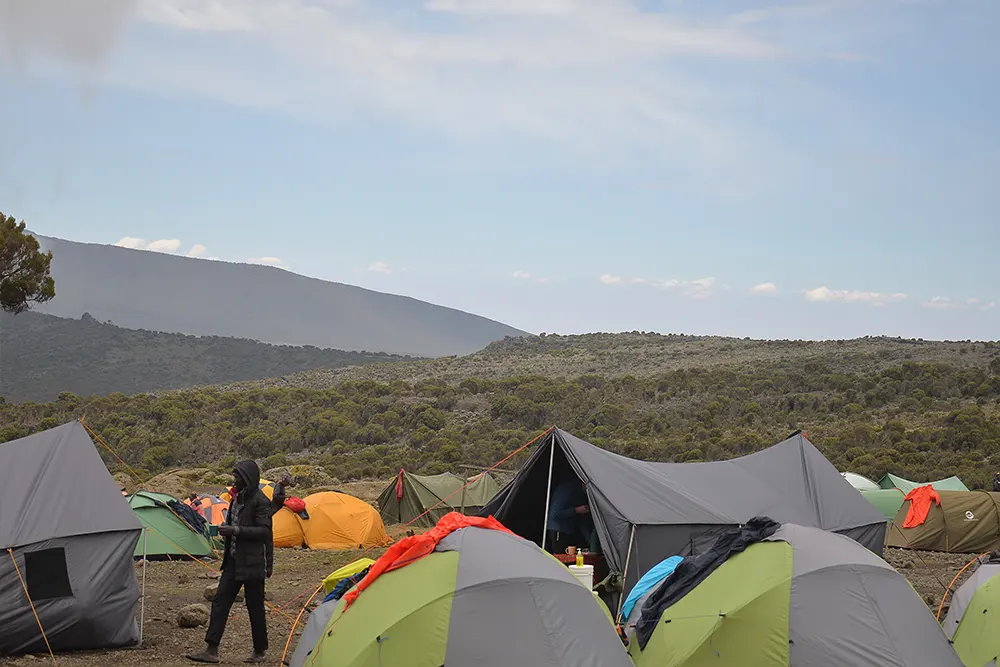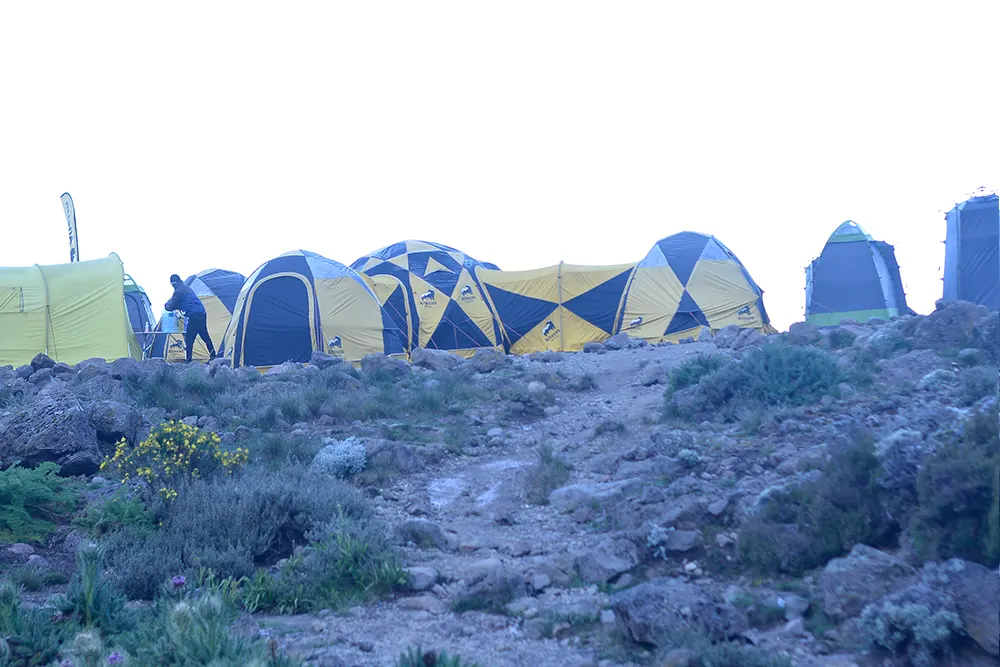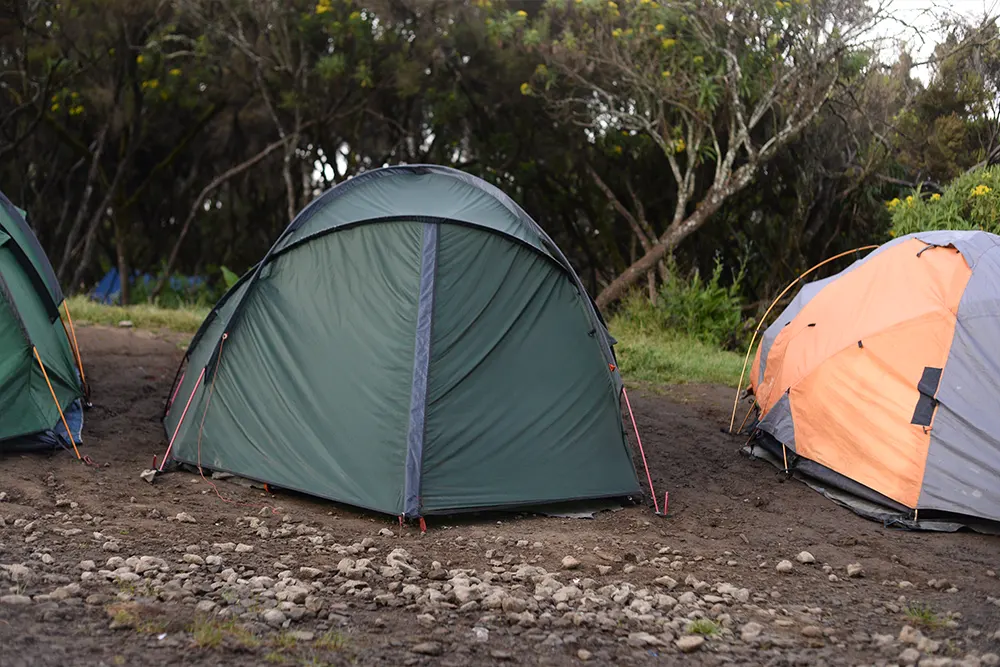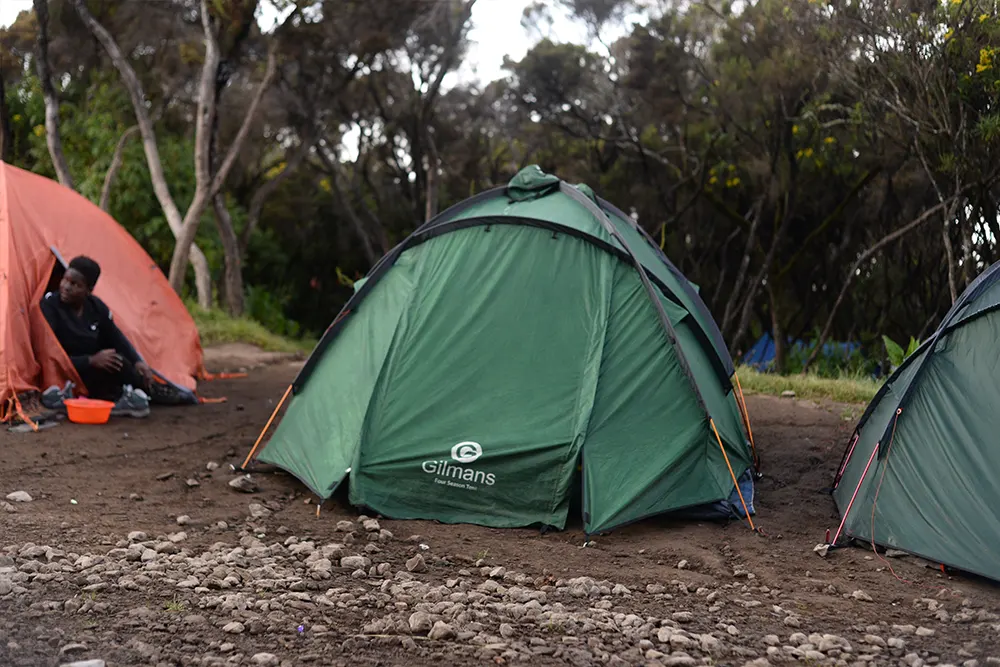Day 1: Drive from Moshi to Machame Gate

After a hearty breakfast, we'll head to the Machame route gate, the starting point of our Kilimanjaro adventure. The drive will take you through picturesque landscapes and local villages, providing a glimpse into Tanzanian culture. Once at Machame Gate, our experienced guides will brief you about the climb and its challenges. The climb commences with a climb through lush tropical rainforest, surrounded by diverse flora and fauna. After 4-6 hours of climbing tour, we'll reach Machame Camp, where you'll be accommodated in a double occupancy tent.
Destination: Machame Gate To Machame Camp
Accommodation: Machame Campsite
public camp site
Meals & Drinks: Breakfast, Lunch, Dinner, Drinking water
Day 2: Start climbing from Machame Camp to Shira Camp

Today's climb takes us through various vegetation zones, including the moorland. The trail offers stunning views of the Shira Plateau and the surrounding landscape. As we ascend to higher altitudes, the vegetation becomes sparser, and the air crisper. We'll pass by the fascinating Shira Caves before reaching Shira Camp. Here, you'll rest in cozy double occupancy tents and enjoy the serenity of the mountains.
Destination: Machame Camp To Shira Cave
Accommodation: Shira Cave Campsite
public camp site
Meals & Drinks: Breakfast, Lunch, Dinner, Drinking water
Day 3: Shira Camp climb up to Barranco Camp via Lava Tower

We'll continue our ascent, crossing the high moorland and the rocky Lava Tower. The changing landscape provides a unique experience as we approach Barranco Camp. The Barranco Campsite is nestled in a beautiful valley, offering breathtaking views of the surrounding peaks. Tonight, you'll stay in comfortable double occupancy tents.
Destination: Shira Cave To Lava Tower To Barranco Camp
Accommodation: Barranco Campsite
public camp site
Meals & Drinks: Breakfast, Lunch, Dinner, Drinking water
Day 4: Descend to Barranco Camp climb to Barafu Camp
.webp)
Today's climb starts with a descent into the Great Barranco Valley, followed by a challenging climb up the Barranco Wall. Our guides will assist you through this exhilarating section. As we proceed, the landscape transitions into an alpine desert, providing a surreal setting. After a demanding but rewarding 6-8 hours of climbing tour, we'll arrive at Barafu Camp. Here, you'll be accommodated in double occupancy tents.
Destination: Barranco Camp To Karanga Camp
Accommodation: Barafu Campsite
public camp site
Meals & Drinks: Breakfast, Lunch, Dinner, Drinking water
Day 5: Scrumble up to Summit Day!

The most awaited day has arrived - Summit Day! We'll start the ascent to Uhuru Peak, the highest point on Mount Kilimanjaro, in the early hours of the morning. The climb is challenging and will test your endurance, but the sense of achievement at the summit will be immeasurable. Witness the breathtaking sunrise over the African plains from the roof of Africa. After spending some time at the summit, we'll begin our descent to Millennium Camp for a well-deserved rest. Tonight, you'll stay in comfortable double occupancy tents.
Destination: Barafu Camp To Uhuru Peak To Mweka Camp
Accommodation: Mweka Campsite
public camp site
Meals & Drinks: Breakfast, Lunch, Dinner, Drinking water
Day 6: Descend to Mweka Camp climb up to Mweka Gate
On the final day of our climb, we'll descend through the lush rainforest, with the sound of chirping birds and the rustling of leaves accompanying us. The forest is rich in wildlife, and if we're lucky, we may spot some intriguing creatures along the way. Our journey will end at Mweka Gate, where you'll receive a certificate to commemorate your accomplishment. From here, we'll transfer you in Moshi.
Destination: Mweka Camp To Mweka Gate
Meals & Drinks: Breakfast, Dinner, Drinking water
TOUR PRICE/COST
We offer two pricing options:
The cost is shared within your private group. More people means a lower price per person.
Join others on a fixed-date tour at a set per-person rate—ideal for solo travelers or small groups.
Private (Shared) Price
| No of pax | Adult | Child |
|---|---|---|
| 1 pax | $1,479 pp | $1,109 pp |
| 2–4 pax | $1,454 pp | $1,091 pp |
| 5–9 pax | $1,429 pp | $1,072 pp |
| 10–15 pax | $1,404 pp | $1,053 pp |
| 16+ pax | $1,404 pp | $1,053 pp |
Group joining price
| Adult | Child |
|---|---|
| $1,454 pp | $1,091 pp |
PRICE INCLUSIONS & PRICE EXCLUSIONS
InclusionsThe Booking Form

6 Days Climbing Kilimanjaro via Machame Route
Begin on a soul stirring adventure with our ethical Kilimanjaro climb via the picturesque Machame Route
N.B: After you send your booking we will get back to you with in 24 hours.
.webp)
.webp)
.webp)







.webp)
.webp)
.webp)
.webp)






.webp)
.webp)
.webp)
.webp)















.webp)
.webp)
.webp)
.webp)























